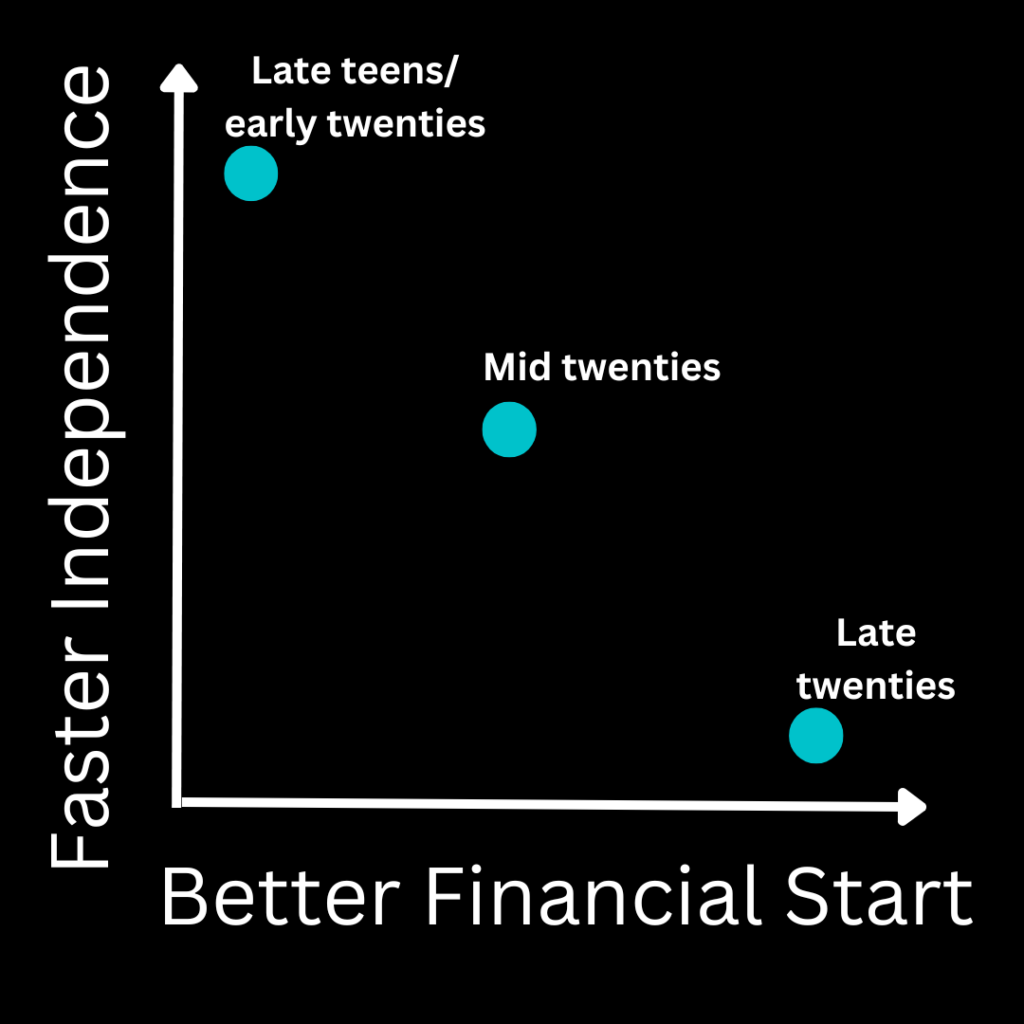Trying to figure out the best age to move? Feel like everything you read either says you’re too young or too old (or somehow both at the same time)? No worries!
If you want some principles to help you figure out the best age in general, and for you in particular, look no further.
Generally, the best age to permanently move out of your parents’ house is in your mid-twenties. This allows you to get a good start on your career without delaying the move to independence too much.
Let’s break this down, including ways to see if you’re the exception to the rule.
Why Is Your Mid-Twenties a Good Time to Move Out?
Moving out in your mid-twenties strikes a good balance between setting yourself up for financial success and cultivating your own independence.
By moving out, I don’t mean for college, as that’s a unique time when you usually come back home for the summer and may move back in after graduating. While your independence grows during that time, it’s much different than being solely responsible for your bills and chores.
Rather, I mean making a move where you never intend to move back home with your parents. This is often getting your first apartment, but it could also be getting a house.
This leads us to the financial reasons why moving in your mid-twenties might be a great idea.
Finances
Paying for your own living expenses is quite a cost, often between 25%-33% of your gross income. If you have student loans, paying those off while having a rent payment can leave you without any spending money.
This is where living at home after college for a few years can really help. It gives you some flexibility in your career and financial situation.
If you know an internship will give you a great chance to land the job you want, you can likely take a few months to do that while living at home.
Additionally, if you want to buy a house, living at home longer to save can drastically speed up the timeline.
I didn’t go stay home after college, but my wife did. As a result, she had 4 times more money saved for our down payment than I did. That allowed us to buy a home within our first year of marriage.
Whether it’s even a good idea to buy a house has come under much speculation. This article weighs some of the pros and cons of renting versus buying.

Independence
This is something I talk about frequently in other articles on trying to figure out if it’s time to move out. Getting out on your own helps you mature in new ways that will pay dividends over the course of your life.
The drive for independence varies widely from person to person based on things like personality and upbringing. That being said, you shouldn’t delay the start of your life too long.
The skills and resilience you learn from the pressures that come with being on your own are invaluable in all areas of life.
Getting settled into a career brings a lot of challenges and growth, so delaying moving out while working through some of those things is totally fine, especially because of the perks it brings financially.
Being in a good financial spot during the transition to living out of the house will prepare you for any mistakes you make. Mistakes and missteps happen. Some things you can only learn through experience, but having a buffer for when they do can certainly help.
Why You May Want to Move Out BEFORE Your Mid-Twenties
While moving out in your mid-twenties is a great idea for the reasons above, it may not be what you want to do.
When I moved out for my senior year of college, I never moved back home. This was for a few reasons.
First, I grew up in a small town without a lot of jobs or career paths, especially in my field. My college was in Phoenix, one of the biggest cities in America, so the possibility of finding a job was made much easier by staying there.
Second, I grew up with the expectation that I would move out at 18, so the independence side of the equation that we looked at earlier skewed in favor of a younger move-out age.
If these or similar factors are at play in your life, then moving out before your mid-twenties may be the right decision. You can’t save money if you aren’t making any money, so if you can’t find a job where your parents live, then moving out may turn out to be the best financial choice.
Why You May Want to Move Out AFTER Your Mid-Twenties
On the flip side, there may be reasons that moving out later would be a better choice.
Looking again at the finance and independence scale, moving out in your late twenties will give you even more time to save. Alternatively, if you’re pursuing a PhD, MD, or similar degree, staying at home will reduce the debt you have to take on, making the financial transition much easier.
However, you do lose a lot of independence this way as many lessons need to be learned by experience, regardless of age.
That being said, if you’re in a situation where being at home also helps your parent(s), especially if they have health issues, then staying longer can make sense outside of the finance and independence variables.
What age given your current situation is the best for you to move out?
We can chart what we’ve learned on the following graph about the best age to move out.

As you can see from the chart (that by no means accurately covers every situation), the best age for you to move out depends on how quickly you want to be independent and the type of financial picture you want to have when moving out.
Moving out in your mid-twenties is a great starting point and will work best for most people. Some will prefer to move earlier or later, however. With all of this in mind, you can make the best decision for you based on what’s best for your situation and personality. You got this!

